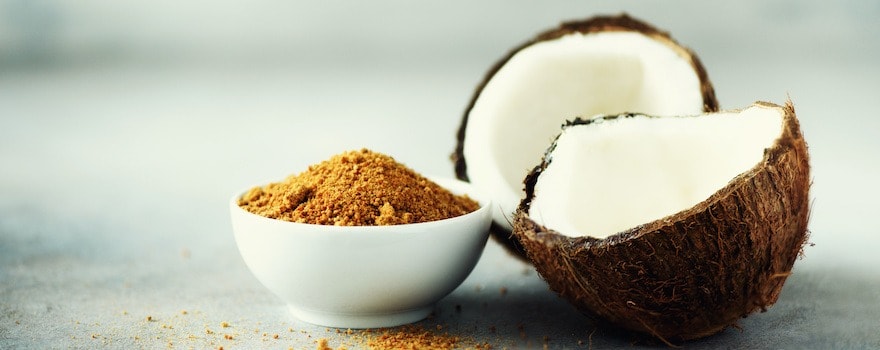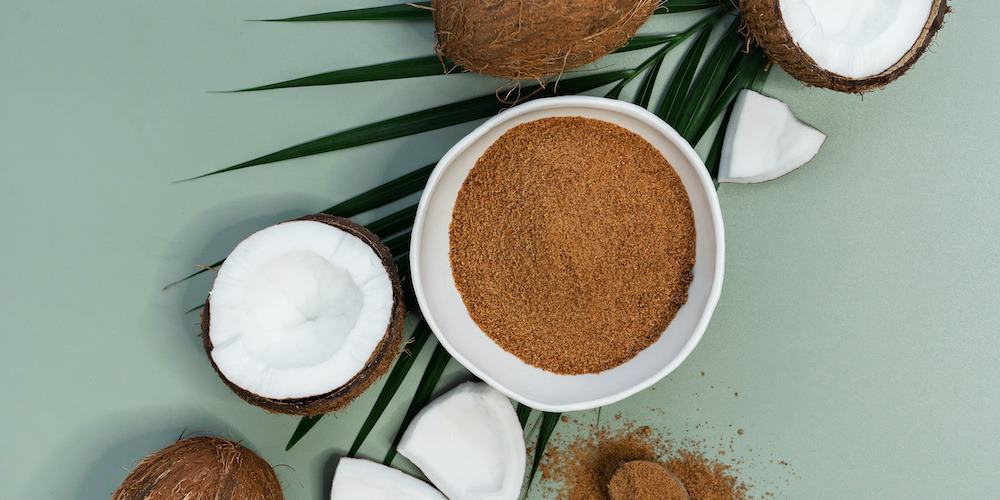The benefits of coconut sugar
Coconut sugar — what is it?
The coconut yields many by-products: coconut water, milk, vegetable oil and even coconut sugar. Throughout the year, the coconut palm (Cocos nucifera) produces small white or yellow flowers.
They are grouped into inflorescences that can reach 2 m in length! Each flower stalk contains sap. By making an incision in the stalk, this sap is collected to obtain the famous coconut sugar or coconut flower sugar.
Once collected, it is heated to allow the evaporation of water. At this stage, a syrup is obtained which can be used in sweet dishes and desserts. To obtain coconut sugar, this syrup is heated for longer.
Once thickened and crystallized, it is ground into a powder, sifted, and then dried before being packaged.
Coconut flower sugar releases a delicious aroma and a pronounced caramel flavor. The coconut flavor, for its part, is light and subtle. It also has a nice brown color, similar to that of rapadura (whole cane sugar).
The virtues of coconut sugar
In addition to its flavor qualities, it has many nutritional benefits. It is composed of 85% sucrose, 4% fructose and 4% glucose. The remaining portion includes vitamins, minerals and trace elements. It notably contains vitamin C and B-group vitamins (B1, B2, B3, B6 and B7).
It is also rich in potassium (1030 mg per 100 g), in magnesium, in iron and in zinc. It contains proteins and no fewer than 16 amino acids including tryptophan.
Finally, this study reveals that the sap from which it is extracted contains numerous antioxidants (polyphenols). Nutritionally, it is therefore far more interesting than regular white sugar.
It is also characterized by its low glycemic index, which ranges from 35 to 37. For comparison, that of white sugar is 70.
Like lucuma, it is an interesting option for people with diabetes. However, you should still make sure to consume it in moderation.

How to choose it and use it properly?
Choosing the right coconut sugar
Coconut sugar is currently enjoying strong popularity. It is presented as a healthy and natural substitute for white sugar. You can easily find it in organic stores, in some supermarkets or online. A few tips if you want to buy some :
- Choisissez du sucre de coco certifié bio. Il doit être non raffiné, sans produits chimiques, agents blanchissants ou additifs synthétiques ;
- Privilégiez les filières équitables qui soutiennent le travail des petits producteurs. La plupart du temps, le sucre provient d’Indonésie ou des Philippines ;
- Il existe du sucre de coco cru issu d’une cristallisation à froid. Dans ce cas, la sève est chauffée à basse température pour en préserver tous les nutriments.
In the kitchen
In cooking, it has a good sweetening power, higher than that of regular white sugar. It therefore allows you to sweeten gently and in smaller amounts. Thus, 80 g of coconut sugar is equivalent to about 100 g of white sugar.
It is used in many preparations to which it gives a pleasant caramel flavor: mixed into yogurt, added to cake recipes, homemade cookies and pastries…
It can also sweeten teas, coffees and other hot beverages. Finally, it pairs well with sweet/savory or exotic recipes: roasted pineapple, Caribbean coconut flan…
Keep it at room temperature and protected from moisture to prevent crystal formation.

Coconut sugar recipe ideas
Oat and chocolate cookies
These cookies are perfect for a healthy, nutritious, and indulgent snack. They’ll satisfy your little hunger pangs throughout the day.
To make this recipe (about 10 cookies), you will need:
- 70 g de flocons d’avoine
- 70 g de farine de votre choix (avec ou sans gluten)
- 30 g de sucre de coco
- 50 g d’huile végétale de coco
- 20 g de fruits secs (cranberries, baies de goji…)
- 1 à 2 cuillères à café de lait végétal de votre choix
- 40 g de chocolat fondu
In a bowl, mix the oats with the flour and coconut sugar. Then add the coconut oil and mix with your fingertips. Finally, pour in the plant-based milk, add the dried fruit, and form a dough.
Divide the dough into several balls and place them on a baking sheet lined with parchment paper. Slightly flatten the balls and bake them in the oven for about 15 minutes at 180°C.
Once golden, remove your cookies from the oven and drizzle them with melted chocolate. Let cool and enjoy !
Sweet potato cake
Here’s something to surprise your guests with: an original cake with a mild flavor and a moist texture. To make this recipe, you will need:
- 200 g de farine de votre choix (avec ou sans gluten)
- 1 cuillère à café de levure
- 80 g de sucre de coco
- 1 œuf
- 10 cl de lait ribot (lait fermenté)
- 3 cl d’huile d’olive
- 180 g de patates douces
- 70 g de cerneaux de noix
- 1 cuillère à soupe de rhum (facultatif)
In a bowl, mix the flour with the sugar and the baking powder. Then roughly chop the walnut halves and grate the peeled sweet potatoes.
In another bowl, beat the eggs with the milk, the oil, and the rum. Add the grated sweet potatoes and mix. Finish by adding the flour/sugar/powder mixture, then the chopped walnuts.
Pour the batter into a loaf pan lined with parchment paper or greased. Bake for about 50 minutes. Let cool before removing from the pan and serving.



